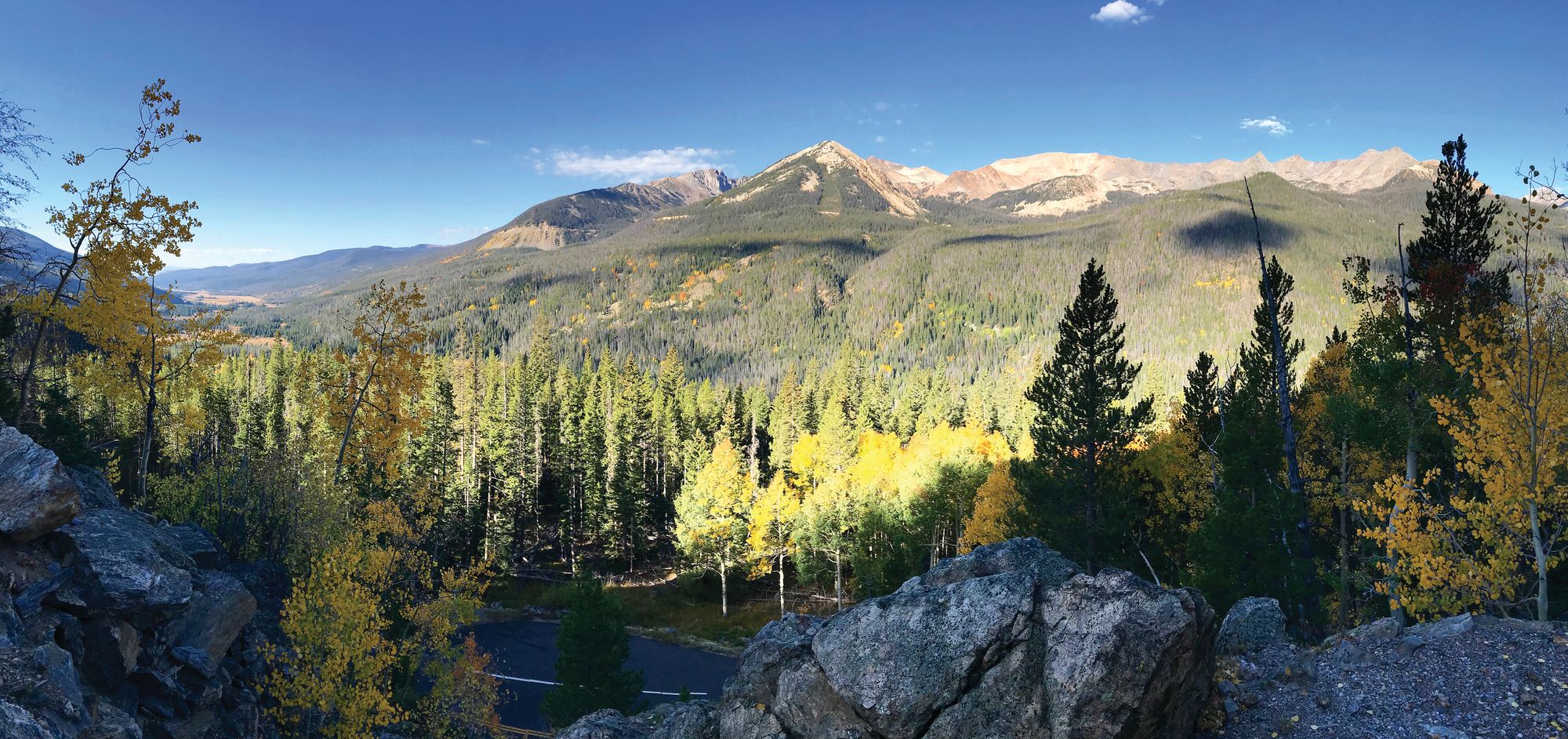In Pursuit of Wildness: Rocky Mountain National Park

Bear with me, as it’s been 1,200 miles since I left Three Rivers, CA, and the wild views before me are stunning. The Rocky Mountains in Colorado stand majestically before me. The Quaking Aspens tremble in the wind. The weather is mild. I’m on a “rocky mountain high,” and this is where this story begins.
Trail Ridge Road is the highest continuous paved highway in the United States. I’m sure of that fact, as we lived in Estes Park for nearly seven years while I worked for the National Park Service. We lived at 7,500 feet in Estes Park, CO, and our family loved to hike, ski, fish, and camp in this national park, which was our backyard.
Tonight, I’ll camp at 8,900 feet at Timber Creek Campground on the west side of Rocky Mountain National Park along the Colorado River. My tent is on my motorcycle, but I choose to lay my sleeping bag in the open, under a billion stars. The Milky Way is within reach and leads my finger to the north star. A shooting star crosses the entire sky in seconds. Elk are stirring in the meadow, and the bugling sounds of the males is mesmerizing. Stars, elk bugling, a coyotes’ howl—so primal.
As I prepare my site, a fellow camper stops by. “Thanks for flying the American flag,” the woman says as her small dog carefully looks over my motorcycle. I respond wearily, “Thanks, it’s just something that I do.’’ A few minutes later just before dark, she returns with her husband, each carrying a bundle of firewood. “It’s late, we know, but we wanted you to have a cozy fire,” she says. The fire warmed my body and the kindness of strangers, my soul.
In the morning, a big bull elk cautiously comes out from the brush. He is determined to impress the six cows 50 feet ahead of him. His bugle is incredible, a surreal sound. Nature in its glory, oblivious to me and my motorcycle.
Trail Ridge Road overlooks Fan Lake. In 1982, the Lawn Lake Dam break inundated Estes Park with a 7-foot wall of water. I remember reading about it in the local newspaper at that time. This massive display of nature unleashed can be witnessed in the Alluvial Fan and Fan Lake.

Trail Ridge Road, which reaches an elevation of 12,183 feet, is a rush on a motorcycle. It follows a path that the Ute and other Native American peoples used for thousands of years. Today, it connects the towns of Estes Park and Grand Lake. The views around every curve are magnificent. Be sure to pull over at the rest stops and enjoy the moments. The Alpine Visitor Center at nearly 12,000 feet is a must stop to learn about the Alpine Tundra ecosystem. Then take the short hike along a paved trail for a panoramic view of the Rocky Mountains. A picture at the top of the trail, next to the sign indicating 12,005 feet is a great photo op. The air is thin, so bring water and stop often. There in the distance is Longs Peak at 14,259 feet.
Tonight, I’m camping at Moraine Park Campground. Sites fill up quickly, so consider making a reservation ahead of your visit. Don’t despair if you find the campground full. Approach the ranger and ask about cancellations. The free park shuttle is a perfect way to explore Bear Lake and Moraine Park while avoiding traffic congestion.
In the morning, I stop by the house where we once lived. Years ago, we planted a 3-foot blue spruce and a small pine tree. These two trees are now easily 50 feet. Memories flood my mind in seconds.
The park brochure is full of helpful information, and something new to me—a plea for help to protect the park. It’s called the Rocky Pledge: “To preserve unimpaired for this and future generations the beauty, history, and wildness therein, I pledge to protect Rocky Mountain National Park.”
After 1,200 miles, my soul is revived as John Denver sings “Rocky Mountain high, Colorado.”
Planning a Visit
With more than 300 hiking trails, Rocky Mountain National Park is one of the most visited national parks in the country, encompassing 415 square miles. Enjoy Trail Ridge Road, which includes many overlooks to experience the subalpine and alpine worlds. Have your camera ready to photograph the elk, bighorn sheep, and moose. Yellowstone National Park has its “bear jams.” At Rocky Mountain National Park, there are “elk and moose jams.” These opportunities provide for some great pictures. Patience is the word. The high country of Rocky Mountain National Park may have extreme weather patterns but generally, summers are sunny and warm. Be sure to carry a light windbreaker. Also, plan for at least three days to explore Trail Ridge Road, Bear Lake, Moraine Park, and other prime spots. The park brochure is invaluable.
There are five campgrounds at $26 per site ($13 with applicable pass):
- Aspenglen 8,220 feet (54 sites)
- Glacier Basin 8,500 feet (150 sites)
- Longs Peak 9,500 feet (26 sites)
- Moraine Park 8,160 feet (244 sites)
- Timber Creek 8,900 feet (98 sites)
To Do
Day hiking, ranger-led programs, visitor centers, museums, scenic drives, wildlife watching and photography, picnicking, horseback riding, camping, fishing, mountain climbing, wildflower viewing, star gazing, Holzwarth Historic Site tours, and driving the historic Old Fall River Road (dirt). The towns of Grand Lake and Estes Park are great tourist spots, offering a wide variety of amenities and services.
Hours
Open 24/7/365, weather permitting. Highest visitation is in July and August.
Cost
$30 per motorcycle; $20 individual; $35 vehicle. All passes valid up to seven days for Rocky Mountain National Park. Annual pass $70.
